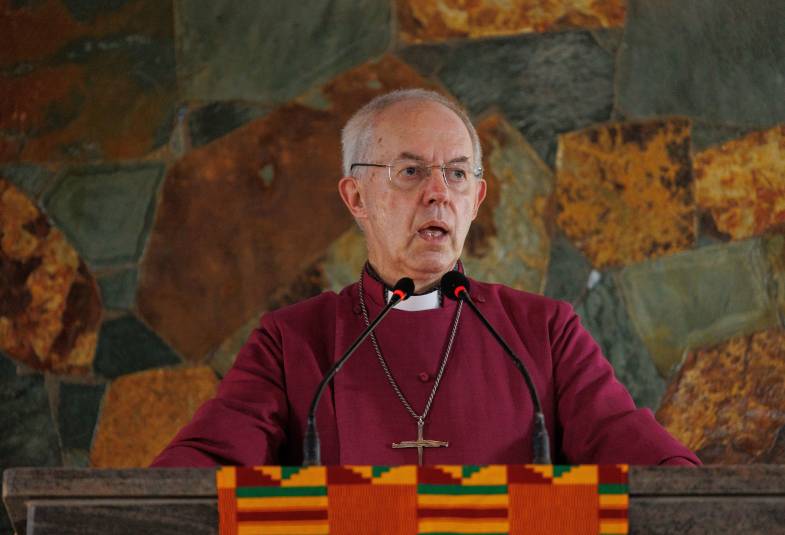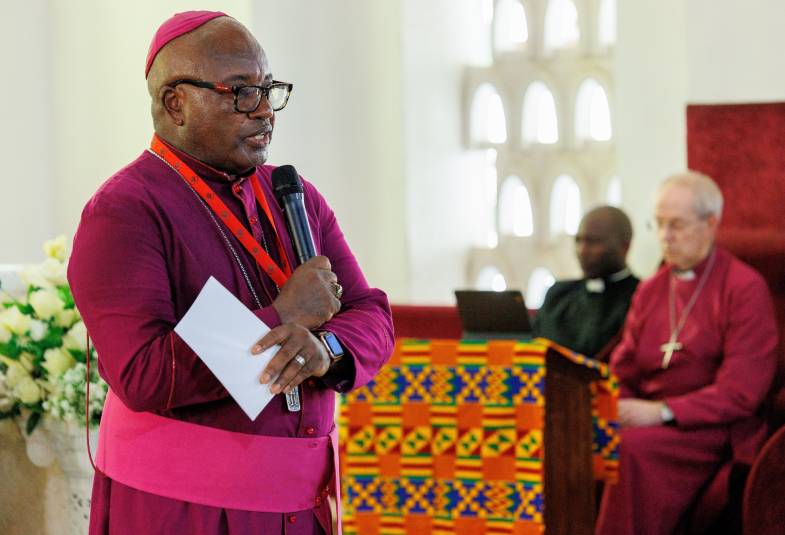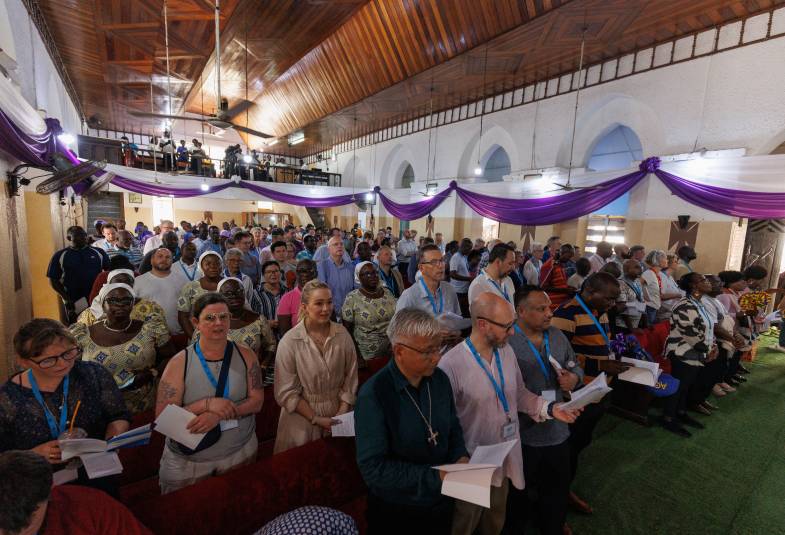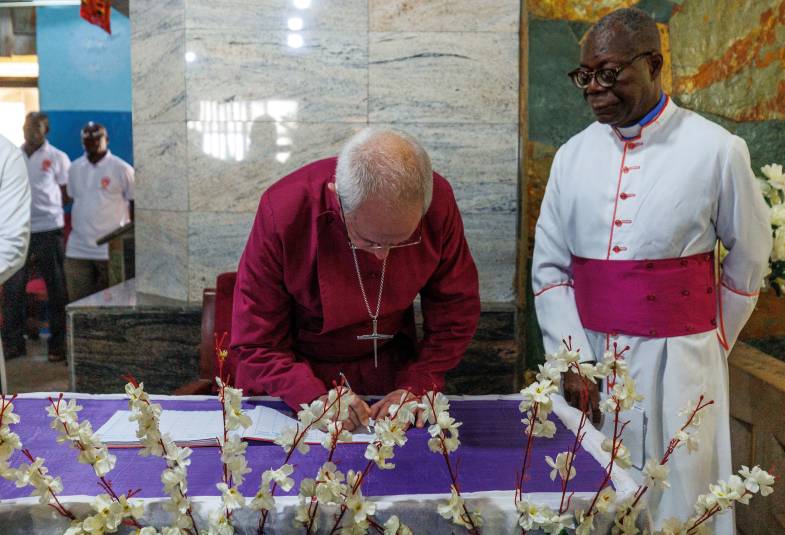15/02/2023
Read the Archbishop's homily at a Service of Reconciliation at Christ Church Anglican Cathedral at Ghana's Cape Coast today, following a visit to Cape Coast Castle where enslaved Africans were imprisoned before transported to the Americas on British slave ships.
The service was led by the Anglican Bishop of the Cape Coast, Victor Atta-Baffoe, and attended by the Primates of the West Indies and West Africa, as well as the members of the Anglican Consultative Council who are meeting in Accra this week.

Matthew 5: 1-12
One of the Beatitudes reads: “Blessed are the peacemakers, for they shall be called children of God.”
We have just held silence for a moment having witnessed what is almost beyond words. Into this part of the coast of Africa, Europeans of different nations brought the same industrial approach to cruelty that has been the characteristic of Europe over the centuries, since the Renaissance.
Its deepest element is the denial of humanity. Whether it is the Governor building his home and his chapel above the dungeons, ascribing no value at all, unless they were women who he desired. Whether it is that dreadful precursor of Auschwitz, that model where prisoners were put in a cell with no food or water in the dark until they died. In all of those we see a coherent pattern, a conscious pattern, of denying the humanity of others. The Beatitudes show the degree to which that was blasphemy.
We saw on the walls of the condemned cell the scratches of those words, I know not what, in the dark. In the cell at the top of Lollards’ Tower in Lambeth Palace, there's a cell with eight iron rings, and in Latin is scratched from the 15th century: “Pray for us poor Lollards, imprisoned by the cruel Archbishop of Canterbury.” Again, they were seen as less than human.
Let me tell you a story of a letter. It was a letter written by one Christian to another Christian in 1723. The first Christian was a slave in Virginia, and he sent it across the world to another Christian the ‘Archbishop of London’. There wasn’t an Archbishop of London. There was a Bishop of London and an Archbishop of Canterbury, but he would scarcely be expected to know that.

The writer, or the writer’s forebears, passed through this place. In the letter he pleads for freedom and says to the bishop, “Even if you can't grant us freedom, send us a chaplain to baptise our children, so they may know the gospel.” The letter survived. It was discovered very recently. It's on exhibition in Lambeth Palace Library. As far as we know, it was never answered.
Three hundred years later, how do we reply to that desperate plea expressed in careful handwriting of great elegance, in language of immense restraint and courtesy, on a torn piece of paper salvaged probably from a wastepaper basket? How do we reply to someone who knew only injustice from Christians, and yet still had faith in the mercy of God? To hear the gospel and to announce freedom are the same thing: to proclaim the gospel is to announce freedom.
It is also to announce equality. It is to announce that God makes no distinction. And very occasionally in Christian history, very occasionally, that is known and seen and done. But even if it is not done when the gospel is announced, even if it not taken as the gospel of liberation, of freedom and hope - not just freedom in the spirit, but free freedom - even if that is not taken on board, those words echo around those soiled cells, day by day, hour by hour. They are lodged in the stones, and they speak to us: ‘Give us freedom!’
When we look around the world, we must ask ourselves, “What are we doing today, that a group in 200 or 300 years will be sitting here thinking, ‘How could they? How could they?’ Is it the trade in arms, so huge? Is the cost of defence, so enormous - 3 trillion dollars a year – that if displaced to be used for development, there would be no need for the trade in arms?
Is it those who split churches in the midst of wars for reasons of doctrine? Is it those who resent the loss of their position? Is it the trade system and the finance system which says to the Islamic world, “You can't trade unless you use interest (usury)”? Or is it something that’s so normalised that it would never cross our minds?
The leadership of the Church Commissioners are with us today. As you know they investigated the Church Commissioners’ historic links with transatlantic chattel slavery. And in response to what they said – for the first Church Estates Commissioner is the descendant of slaves, slave owners and indentured labour – they announced £100 million new impact investment funds. I pray that money might just be the mustard seed that grows into a mighty tree. The mustard seed which sown in faith becomes something much greater.
We discussed this, and one of the questions in the fringe event last night was, ‘Why £100 million? How much did you make out of slavery?’ And with great honesty the Commissioners answered, “About £400 million.” Why £100 million? Well, 98% of the letters I got said it was roughly £100 million too much – I think getting it through the systems if we’d gone further, might have been impossible, and politics is the art of the possible.

But let me say that must just be a down payment. Because repentance requires sacrifice. To be a Christian is to recognise our past sin and brokenness and need for God, but our present and future sin and brokenness and our need for God. It is to say as the psalmist says, ‘Deliver me from the sins of which I am not aware that I am committing.’
And therefore we must begin on our knees asking for God, who blesses the broken, the hated, the despised, and the mourners, the bereaved. In looking to the only one who can set us free for all eternity.
But our response does not end there. We are called to transform unjust structures, to pursue peace and reconciliation, to live out the Beatitudes. We cannot be content to watch from as far away as television and say ‘Our thoughts and prayers are with you.’ We must go. We must speak. We must seek justice and pursue it.
When God calls Abraham in Genesis, he blesses him and makes him a blessing to the world, that those who bless him and his descendants will be blessed. And we are his descendants.
As a Communion, as churches, we are called to be a blessing wherever we are. Blessings are not always comfortable things to have. We are blessed and we are to be a blessing, and that means when we see people humiliated, imprisoned unjustly, forced from their country and prevented from enter another by walls or channels, then we must say so, and we must welcome them.
In doing so, in striving for justice, healing and reconciliation, in transforming unjust structures, in doing that we whisper in shame back to the stones, “We don’t do enough, but we hear you.” And we whisper, “We will do more.”
